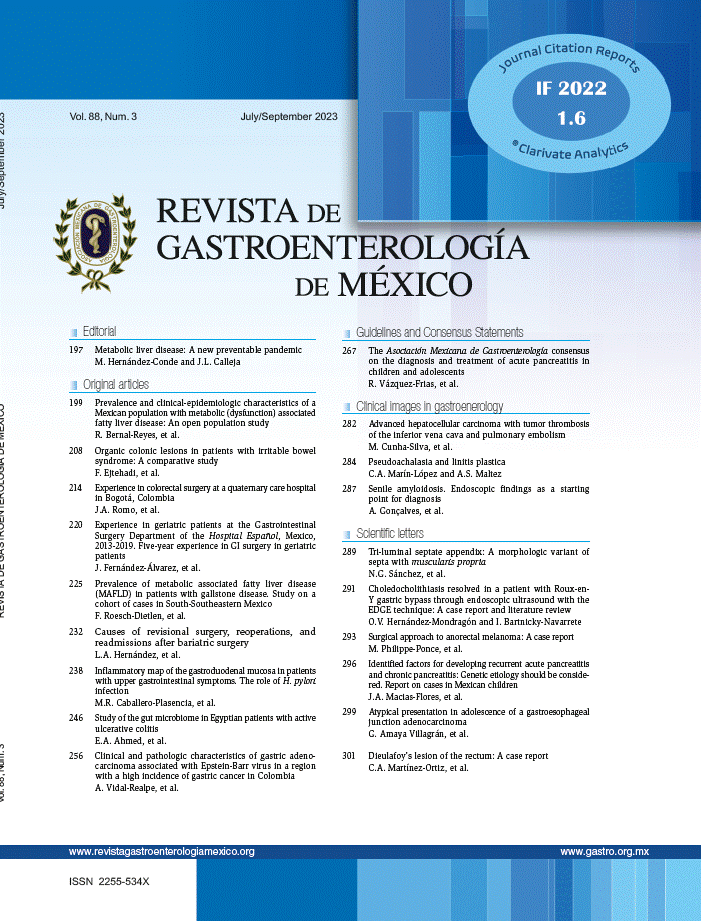We have read the consensus statement by Aiza-Haddad et al.1 with interest and would like to share the following thoughts and comments. Splanchnic vein thrombosis (SVT), which encompasses portal vein thrombosis (PVT), superior mesenteric vein thrombosis, splenic vein thrombosis, and Budd-Chiari Syndrome, has an incidence of approximately 15-27% and is currently an important cause of morbidity and mortality in patients with liver cirrhosis.2
Therapeutic anticoagulation is the first-line treatment for SVT, especially when acute (recent), extensive, progressive and/or near complete/complete occlusion (>50% to 100%) of the splanchnic vasculature features are present.1,2 Low-molecular-weight heparins and warfarin have long been the standard of anticoagulant treatment in this setting, whereas the direct oral anticoagulants (DOACs) are rapidly emerging as safe and effective alternatives, even in the treatment of SVT in compensated liver cirrhosis.3 However, most of the studies that involve DOACs in patients with liver cirrhosis have been retrospective in nature, with small sample sizes and heterogenous populations. In addition, there are still a number of concerns about the safety of DOACs for these patients. They include relative or absolute contraindications in Child-Pugh class B or C patients and a potential for an increased risk of major gastrointestinal bleeding events, particularly in high-risk patients (e.g., age > 75 years, thrombocytopenia ≤ 50,000/µL; prior history of major gastrointestinal variceal bleeding events, concomitant advanced chronic kidney disease, and conversion to hepatocellular carcinoma).
More recently, research has focused on new classes of anticoagulant drugs, namely factor XI/XIa inhibitors. The rationale supporting their development lies in the role of factor XI, which can modulate the formation and amplification of pathological thrombosis, while having a very modest role in physiological hemostasis. Thus, uncoupling/separating thrombosis from hemostasis may lead to a greater safety profile with these new drugs.4 Several factor XI/XIa inhibitors have been evaluated in phase 2 clinical trials, including parenteral antisense oligonucleotides (ASOs) (e.g., fesomersen, IONIS-FXI), monoclonal antibodies (e.g., abelacimab, osocimab, xisomab), and small molecules (e.g., asundexian, milvexian).4 The AZALEA-TIMI-71 trial was a phase 2 study that evaluated 1,287 patients, comparing two blinded doses of abelacimab (90 mg and 150 mg SQ monthly) versus rivaroxaban 20 mg PO daily in atrial fibrillation. The primary endpoint, major bleeding and clinically relevant non-major bleeding events, for abelacimab 150 mg vs. abelacimab 90 mg vs. rivaroxaban 20 mg, was: 2.7% vs. 1.9% vs. 8.1%, respectively (p < 0.001 for both doses of abelacimab vs. rivaroxaban), leading to an early termination of the study due to the greater than expected benefit with abelacimab.5 A recent meta-analysis of 11 studies that included 10,536 patients concluded that FXI/XIa inhibitors were associated with a significant reduction in bleeding events and incidence of thromboembolism, compared with placebo/standard therapies.6 Results of large-scale phase 3 randomized clinical trials are eagerly awaited, and if confirmatory positive results are achieved, we strongly believe that FXI/XIa inhibitors merit further exploratory, prospective evaluation through clinical trials, analyzing their potential role within the armamentarium of anticoagulation management strategies in these challenging subgroups of patients.
Financial disclosureNo financial support was received in relation to this article.
Conflict of interestThe authors declare that there is no conflict of interest to disclose.




